Foul Play Interview With Creative Producer Jeff Tanton
by Edward
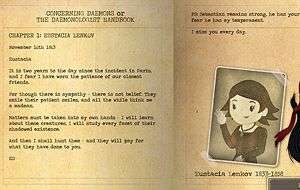 After playing the delightful Foul Play, I put on my finest gentleman attire and invited creator Jeff Tanton to an interview, with the caveat that under no circumstances was I to open with a fluff statement likening the success of Foul Play to a runaway freight train…
After playing the delightful Foul Play, I put on my finest gentleman attire and invited creator Jeff Tanton to an interview, with the caveat that under no circumstances was I to open with a fluff statement likening the success of Foul Play to a runaway freight train…
Jeff, the success of Foul Play is like a runaway freight train!
[Laughs] Thank you! I agree, sometimes I shock myself. You do look dazzlingly handsome today, Ed.
So, Foul Play is quite theatrical, it’s almost as if you some sort of dramatic experience yourself!
Yeah, it’s a little bit like that, I had a really strange route into the games industry; I did a Modern Drama degree which, if anyone’s seen Spaced, the episode where he goes to watch Vulva put on a play, that’s pretty much what I spent three years of my life doing. Luckily I met some amazing people, so it wasn’t an absolute waste of everyone’s time. So, I have a history in the dramatic arts but that really didn’t influence Foul Play; that came from a drunken evening watching Smashing Pumpkins videos, and then it all kind of linked together.
But some of that experience has maybe affected some of the background jokes?
Yeah! I’d say that once we had the idea of Foul Play a lot of that crept in; the awkwardness of people really trying hard to put on an amazing show despite possible lack of money or skill or ability or technology to show the things they want to show. It’s the can-do spirit despite everything, which kind of infuses all the background characters in Foul Play. One of the favourite characters of the team is this little guy called Sweepy, I swear to Christ I don’t know if there’s a million Sweepys or just one backstage, it’s kind of like the Barneys in Half-Life, it doesn’t really matter, you know? Sweepy will just come on and fix shit if it’s broken. It’s wonderful.
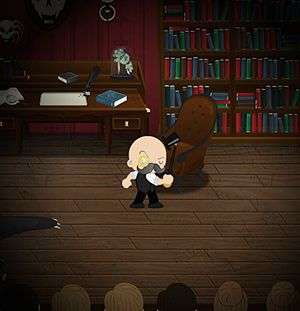 You’ve created quite an enigmatic main character, tell us more about why he’s decided to put on a show of his life?
You’ve created quite an enigmatic main character, tell us more about why he’s decided to put on a show of his life?
The ruggedly handsome main character is a guy called Baron Dashforth; he’s a demon hunter, well actually he’s a daemonologist, which is totally not a made up thing, and if you look in books it’s all there, I’m sure. He spent his whole life hunting demons just like his father before him, who was the pioneer in the field, and he’s a bit Willy Wonka; he’s very secretive, he only has one apprentice called Scampwick, and it’s baffled and excited people that after so long and after being secretive for so many years that he’s decided to tell his life story in such an elaborate but showy way. Part of the story revolves around looking at Dashforth’s past and seeing the things that he’s done, but also why he’s decided to put on a stage show and what his major plan actually is.
So Foul Play genuinely was created after a drunken night out?
Well, it was worse than that, it was a drunken night in! We were just sitting in the studio really, batting ideas about for games, and we had a love for Paper Mario [The Thousand Year Door] and bringing up YouTube videos of that, and then I brought up the Tonight’s The Night video from the Smashing Pumpkins which is, if anyone’s seen it, it’s a pastiche of the very first film-makers and people trying to create an incredible scene with very limited technology, and drunkenly we thought “Yeah, that would be amazing if that was a game!” Then the side-scrolling beat-’em-up came out of that, but it was probably six months beyond that point when we worked out who the Baron was, what he was doing, why it would be fun, and most integrally, why the players might empathise with him. While it’s very funny to see this arrogant British gentleman go about and do his thing, it doesn’t necessarily make him likeable, so we had to really work out his motivation for what he was doing, which might not be evident at first, but hopefully seeps through by the end.
As he’s putting on a show of his life, are there elements that are completely exaggerated?
That’s the thing; our first thought was “is he making this all up?”, is he basically Baron Von Münchhausen, is this really what he’s done, considering he’s so secretive? We shied away from that, not to spoil it for anyone who thought that might be the twist at the end! We didn’t go with that because I just thought it was really unsatisfying for the player to kind of play through only for him to go “Oh, by the way I made all of that up, so screw you guys”. So, it definitely happened, but I like to think that because the Baron always has a plan, I like to think in my head that he would have exaggerated, and I think there’s elements he’s played up because the most important thing for him is to get the audience on his side, and that all comes into play later. I’d say yeah, he probably stretched the truth occasionally.
One of the things I really loved about Foul Play is how quickly the combat mechanics all come together, so even in the first couple of fights you can get up to a fifty-hit combo if you try really hard. How difficult is it making it that simple, yet deep yet immediately challenging?
There were a couple of things that were really important to the combat. First, there’s a lot of little brothers and sisters on our team, so we’re always used to being given the second character and hammering the A, B and C buttons on our Genesis controllers while our older siblings would pull out the combos and get through the game. It’s that feeling that we really want to get; there is network multiplayer, but we love the local multiplayer as well, we want anyone to come along, hit buttons and smash stuff up. I think one of the greatest fighting games ever for that is Soul Calibur, because it’s got that level where anyone can come in and look flashy and amazing, but once you start thinking about it and once you start blocking there’s this paper scissors stone to what people are going to do, and the game takes on this other element. So I drew a lot from that, but simplified for Foul Play so people could just come along and hit stuff, but the combo-building especially is something we do in a lot of Mediatonic games, and that’s where hardcore players are really going to get their kicks. The team have done an incredible job of putting that code together and making it flow so beautifully. I would say that when players come back to the game it’s those “Perfect Scenes” you’re looking for, and every scene, from the first hit to the last, you can stream everything together, and that’s what I really want to see on YouTube. I want to see players going through and getting perfectly choreographed scenes and linking everything together, and that’s where Foul Play really excels.
It’d be easier for everyone if they’ve got Scampwick by their side as well!
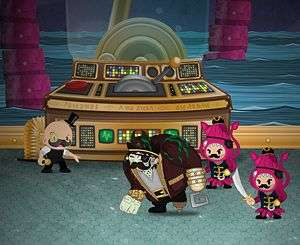 Dennis from Hotline Miami 2 was playing and said “my only criticism is that the second character looks a little cooler than the first”, and I think something seeped through, like I said, a lot of us were the younger siblings and we were always given the second character, so I don’t know if unconsciously we’ve just been making Scampwick’s moves a little more showy, and he’s got a cooler scarf around his face! Scampwick is a lovely character; Dashforth is incredibly pragmatic and good at what he does, and in the Universe we’ve created Daemonology is something of a blue-blood hobby, so whereas Dashforth’s father kind of pioneered it, it’s something that rich young gentlemen decide to take up then disappear two weeks later because they got eaten by a demon and didn’t take the necessary precautions, but they did it for the fame.
Dennis from Hotline Miami 2 was playing and said “my only criticism is that the second character looks a little cooler than the first”, and I think something seeped through, like I said, a lot of us were the younger siblings and we were always given the second character, so I don’t know if unconsciously we’ve just been making Scampwick’s moves a little more showy, and he’s got a cooler scarf around his face! Scampwick is a lovely character; Dashforth is incredibly pragmatic and good at what he does, and in the Universe we’ve created Daemonology is something of a blue-blood hobby, so whereas Dashforth’s father kind of pioneered it, it’s something that rich young gentlemen decide to take up then disappear two weeks later because they got eaten by a demon and didn’t take the necessary precautions, but they did it for the fame.
So in my universe, Scampwick is the choice that nobody would have expected to be made, because he’s from a low background, class is still a factor in the Victorian era, but he’s been picked because he’s capable, and by the time the play’s put on they’ve been fighting demons for twenty years together. I really thought about their relationship; he’s very sardonic, he’s very dry, he’s a good counterpoint to Dashforth, but also there’s this incredibly deep bond and trust and friendship there, which I hope plays through to the end.
You were telling me before that there was a whole dilemma where you didn’t know what to do with Scampwick outside the story elements if there was no player two…
Yeah, because there’s so many decisions about Foul Play that only became evident once we started making the games, so stuff like getting people off the stage; very rarely we do the stage puff of smoke and things disappear, but more often we really wanted to get this element which you’ll see if you play where if enemies collapse at the side of the stage then a cane appears and slowly drags them off. But, there are so many elements at play, so we were going to do something we’d do in a traditional game only to realise that it doesn’t work. One of those was Scampwick, so if someone’s playing a single-player game, what does Scampwick do? We’ve got a fairly smooth transition where Scampwick just kind of disappears back into Dash if it’s a single-player game, but what that highlights is that it’s the story that’s really important. It’s not just go from A to B and beat guys up, we are putting on a show here. We didn’t want to make it too dialogue heavy because there’s always the people who just want to beat the crap out of stuff, and that’s totally fine, but Dash and Scamp have both experienced these things and having them together and both experience stuff together is important.
Once you’ve gone through and you see how the play ends, are there any reasons to make an encore?
 I’d like to think so; we’ve already spoken about the combo system and the perfect scenes, but I think anyone can probably get through the game in four to five hours on their first play. Really the reasons to go back are say the star rating system, so it’s not just about getting through it’s about being consistently good, keeping the audience happy, and if they’re happy you get more points for every hit, and so there’s a much better chance of getting a five-star rating. So there’s coming back and getting those ratings, and we’ve gone deep with the world-building, we’ve basically got the Anarchist’s Cookbook, but it’s the Daemonologist’s Handbook, so players can unlock players from this history we’ve created, with some really, really lovely artwork and stories.
I’d like to think so; we’ve already spoken about the combo system and the perfect scenes, but I think anyone can probably get through the game in four to five hours on their first play. Really the reasons to go back are say the star rating system, so it’s not just about getting through it’s about being consistently good, keeping the audience happy, and if they’re happy you get more points for every hit, and so there’s a much better chance of getting a five-star rating. So there’s coming back and getting those ratings, and we’ve gone deep with the world-building, we’ve basically got the Anarchist’s Cookbook, but it’s the Daemonologist’s Handbook, so players can unlock players from this history we’ve created, with some really, really lovely artwork and stories.
There’s also the fame meter, so when the players are doing something awesome on stage the audience are always reacting to them and giving this visceral reaction, which is why we wanted them on-screen the entire time. When you do something cool you gain fame, if you get enough fame you go up a level, and there’s twelve entirely new moves to unlock, and the player can use those to then impress the audience more. Also when you played it you would have experienced some of the challenges; in each of the twenty-two acts in the game there are three challenges specific to that act, which really plays up to the theatrical aspect of it. Sometimes it’ll be saving the leader until last, so it’s not the natural gameplay reaction of going for the big guy first, because theatrically it’s better to be taking out the minions then leaving the big guy for last, or throwing guys into the destructible scenery because dammit, it’s there, you know? It’d be a shame not to use it! Completing those challenges gives you charms, because some actors takes charms with them to every stage performance, and that kind of feeds into helping people complete challenges later on, so there’s quite a lot of stuff going on.
I assume there were quite a few moments where you had to balance what would make more sense for the story versus what would make more sense for the gameplay?
I would totally say so; the one thing I don’t want to do is force story down people’s necks, because I realised in the people who like the beat-’em-up genre, you really are going to get the people who just want to chase the combos and beat people up, but it’s there if people want it, and I really think it enriches the whole experience. Everything we’ve put in we’ve tried to tie back, so the fact there is a fame mechanic, the fact that there’s lucky charms, because from my theatrical background I know how weird some actors can get about small things they take on-stage, so it made for a nice link into what was going on. We have had to balance, but I’m really satisfied with how the final product has come about, it really is one of those things where for six months I was really hoping everything would click, and then it did, and as soon as we knew what we were doing it was fantastic.
Now Jeff, some people would claim that the audience mechanic is not unlike a certain sequel to a certain papery Mario [we both laugh], it was a really great idea at the time but nobody has really picked it up since, so how difficult was it to take that mechanic and refine it in a way that made it feel unique to Foul Play?
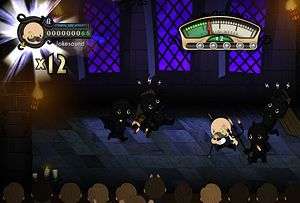 It was one thing I really wanted to do and that was an audience, and I love The Thousand Year Door, it was such a beautifully smart mechanic, but the one thing I wanted to have was this visceral element of the audience, and that was the most important thing for me. For everything else they might do or not do in the game, I used the Rock Band analogy: I think Rock Band is at its most fun when you’re playing the early venues because you have the crowd right up in your face and you can see their reactions, then you build up to the stadiums where the crowd fade out and it’s all about the stage and the crowd are just this shadowy mass in front of you, and that just totally kills it for me.
It was one thing I really wanted to do and that was an audience, and I love The Thousand Year Door, it was such a beautifully smart mechanic, but the one thing I wanted to have was this visceral element of the audience, and that was the most important thing for me. For everything else they might do or not do in the game, I used the Rock Band analogy: I think Rock Band is at its most fun when you’re playing the early venues because you have the crowd right up in your face and you can see their reactions, then you build up to the stadiums where the crowd fade out and it’s all about the stage and the crowd are just this shadowy mass in front of you, and that just totally kills it for me.
I love playing the little pubs in there and seeing the crowds slowly getting into it, so I took that for Foul Play and I immediately knew I wanted them there, I wanted the player to see everything they were doing, it’s got the fame mechanic attached to it but it’s much more about the player seeing and hearing the audience reacting to everything they’re doing. I think that’s something we had that was very different, putting the audience right there with the character and being able to see them the entire time.
Is there a specific reason mechanically that it’s set in the Victorian era, or was it more for story purposes, or is it just that it’s a cool era?
[Laughs] I think it’s the cool era! It just about works, because it comes back to that can-do attitude of the technology, it’s that will to create something ridiculous with maybe not the best technology to do it, and it seems right. Also, I have this whole time-line back on my laptop, and I had to work out the time-line all the way back to Dash’s father, when he learned Daemonology and why, when Dashforth was born, when Scampwick was born, what major world events were happening at the time, just getting everything to sync up. The dates we went with were super specific, because a few years either way and none of it would make any sense! The Victorian era plays well for the gentleman theme and it makes sense to the players, but the dates we’ve settled on are a lot of gears and cogs moving into place.
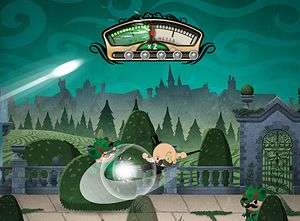 Have you been surprised by gamers’ reactions, or has it been mostly relief?
Have you been surprised by gamers’ reactions, or has it been mostly relief?
I’m glad you were the one to say relief, because it means you’ve seen people play it as well and as you could see, it’s gone down really nicely. Relief? Definitely. It’s coming up to two years I’ve spent working on Foul Play, and it’s a year and a half for the rest of the team, and just getting it out there and seeing people picking up the combos and laughing; humour’s a really hard thing to get across and not everyone’s going to love the humour of the game, but seeing people properly chuckling at the gags and calling people over to show them what they’ve seen…
Putting on silly voices…
MCM was amazing for that, the first time we showed the game it was in an alpha state back at MCM, and people just started doing the voices every time Dash and Scampwick started talking, and I didn’t know that was a thing! You yourself have done some fantastic voices from what I’ve heard, too! [Laughs] It’s lovely, I really like that people click with the characters straight away and kind of want to give them a voice and bond with them.
Were there ever any plans to give them voices, or is it left best to the player’s imagination?
It kind of came down to that at the end, there were a few decisions as to whether we should go with voice actors or not, for us, in the future it might be something we really investigate, and in all our previous titles it comes down to that. With voice-acting, you kind of give a bit of the character away and probably tell you more about the character than maybe is accurate, so I love the fact that people come in and give the voices themselves, but there’s also the English Gentleman thing again; if it’s not voiced exactly right then the first words out of Dashforth’s mouth will make him sound like a hateful, arrogant guy. I think what we’ve ended up worked out really well.
Last five articles by Edward
- Best of 2015: Journey's End: A New Beginning
- Journey's End: A New Beginning
- You Can't Choose Your Happy Ending
- Okay, Let's Fix Comedy In Games - The V-Effekt
- Time Keeps On Smashing Away














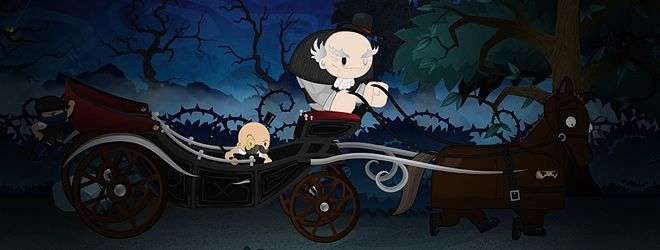
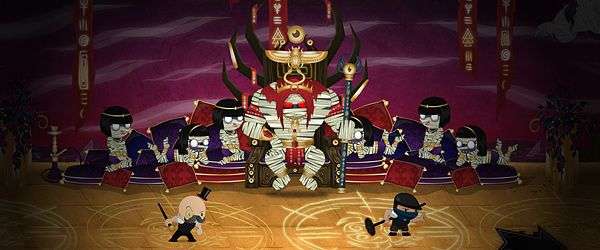
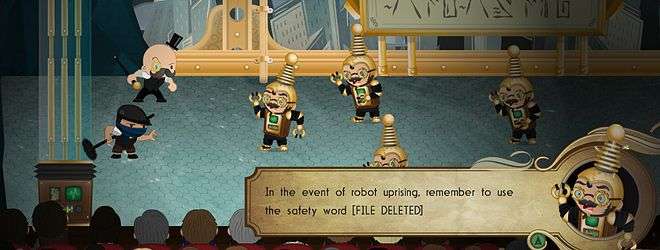
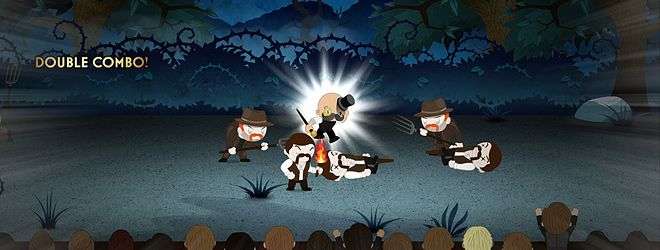
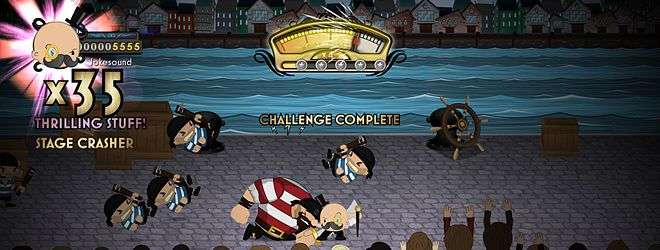





There are no comments, yet.
Why don’t you be the first? Come on, you know you want to!